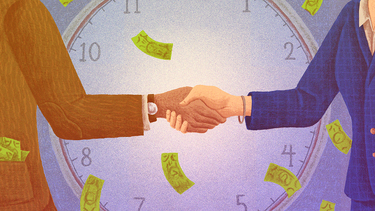New Study Shows that Trust Can Last
Our everyday lives run on a stream of promises made and kept. We show up for appointments, collaborate with co-workers, and fulfill countless other obligations, even when there aren’t negative consequences to failing to do so. A new study co-authored by Yale SOM’s Florian Ederer explores how the trust we place in one another and the promises we make are affected by our ability to communicate and by the passage of time.

Sean David Williams
By Dylan Walsh
On December 25, 1914, soldiers on the front lines of World War I set down their arms and climbed from the trenches to meet one another in no man’s land. They exchanged cigarettes, sang together, played soccer. “What neither the Pope nor all the peace lovers could accomplish by official arrangement the men of the ranks, English and German, put through out of sheer human good will,” the New York Tribune reported. The pause in bloodshed took place five months into a conflict that ultimately claimed 40 million casualties.
The Christmas Truce is a remarkable story of trust. Neither side had any guarantee that the other would not fire; they were avowed enemies in possession of guns. And yet peace, however temporary, held. Why did the men extend such trust? Why, more generally, does one stranger ever trust another, whether or not his life is on the line?
This is a question economists have long puzzled over, Yale SOM’s Florian Ederer among them. “I’ve always had an interest in how people establish cooperation, especially when there is no enforcement, or you can’t rely on the reputations of parties,” he says. “I could promise you something, but there is no reason why you should believe me without a formal commitment—and yet, for some reason, people seem to stick with what they say.”
Driven by this curiosity, Ederer and Frédéric Schneider from the University of Cambridge ran an experiment exploring how the trust we place in one another and the promises we make are affected by our ability to communicate and by the passage of time.
Read the study: “The Persistent Power of Promises”
Ederer and Schneider used a series of “trust games” common in economics in which two strangers are paired together to work through a basic financial scenario. In this case, one of the players, the “investor,” was given two options: he could play it safe, ending the game and rewarding both players with $15, or he could choose to gamble. If the investor gambled, then the other player, the “trustee,” was then given two options: opt out of the game, or opt in. If he opted out, then the trustee got $42 and the investor nothing; if he opted in, then the trustee got $30 and the investor had a five out of six chance of also earning $30 (and a one in six chance of receiving nothing). Critically, one group of trustees was allowed to communicate with their investors—for example, by sending a message of assurance to their investors: if you decide to opt in, I promise to reward you.
Earlier experiments in this vein had found that the ability to communicate increases cooperation; Ederer and Schneider found the same. When communication was not allowed, the investor gambled about 40% of the time and the trustee opted in about 40% of the time; when communication was allowed, both percentages jumped to 60%.
Then Ederer and Schneider built on the previous research by measuring the persistence of the effect of communication over time.
“All of the prior studies looking at promises examined extremely short time horizons,” Ederer says. Participants typically gave a promise and were then asked to make good on it only minutes later. “We allowed for much bigger time gaps between when I say I’m going to do a certain thing and when I actually deliver on that promise.” Some of the trustees who sent messages saying they would opt in waited a day before choosing whether to or not to follow through. Other trustees waited for three weeks. In both cases, rather than taking the $42 for themselves, trustees kept their promises.
For Ederer, this provides a strong endorsement of the power of promises, which in real-world conditions generally commit us to some action not minutes but days or weeks or months in the future.
It’s a hopeful outcome. Nobel laureate Kenneth Arrow described trust as a “lubricant” of our social systems. Time, trouble, and money are saved when one person can simply rely on the word of another—something we do with such regularity that it exists as an unquestioned assumption in most daily transactions. When you make an appointment with a doctor, you don’t sign a legal contract, but nevertheless you usually arrive on the agreed-upon date. The same implicit trust supports collaboration on projects at work and relationships between companies and consumers.
“Pretty much any economic transaction or social interaction where we have to plan production or cooperation over time without writing down a contract, or without reputational enforcement in which someone will punish me if I don’t deliver what I’ve agreed to, is reflected in our game and in our results,” Ederer says. “These findings, I think, are the best evidence to date about the real-world power of promises. People like to stick to their word.”